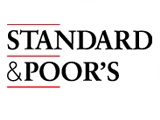|
|
TODAY.AZ / Business
'Azerbaijan - least sensitive to eurozone deleveraging'
01 March 2012 [18:37] - TODAY.AZ
 Azerbaijan is among the countries least sensitive to eurozone deleveraging, report of the Standard & Poor's Ratings Services said. Standard & Poor's Ratings Services' new Emerging Europe Sensitivity Index (EESI) measures the relative vulnerability of 19 emerging sovereigns to potential disruptions to capital inflows from the eurozone.
Azerbaijan is among the countries least sensitive to eurozone deleveraging, report of the Standard & Poor's Ratings Services said. Standard & Poor's Ratings Services' new Emerging Europe Sensitivity Index (EESI) measures the relative vulnerability of 19 emerging sovereigns to potential disruptions to capital inflows from the eurozone.The higher the EESI score, the greater relative vulnerability of an emerging non-eurozone economy to shocks in the Eurozone, the report said.
"We assess Turkey as the most vulnerable to sudden financial account outflows and external refinancing risks: its EESI score is 2.94. The most obvious side effect of Turkey's credit boom has been the rapid widening of its CAD to a multi-year high of 10% of GDP in 2011 (a deterioration also instigated by higher oil prices)," the report said.
Hungary has the second-highest EESI score, at 2.09. "It owes its vulnerability to its external debt stock rather than its external flow position; Hungary actually ran a small basic balance surplus during 2011," the report said.
Of all the sovereigns in the report, Russia (-0.07), Kazakhstan (-0.45), and Azerbaijan (-2.19) are the least sensitive to eurozone deleveraging as measured by the EESI.
"Although all three economies rely heavily on commodity prices (and have been penalized accordingly), their track record of operating repeated annual current account surpluses, amid high foreign exchange reserves and relatively low foreign currency lending, supports their low vulnerability EESI scores. This is also echoed in the dominance of domestic funding of banks' claims on residents in these countries. But significant terms-of-trade shocks would materially undermine their net external positions and weaken fiscal performance, particularly
in Russia, which is operating a non-oil deficit of close to 10% of GDP," the report said.
While the EESI does not directly affect S&P sovereign credit ratings, it does measure relative sovereign vulnerabilities to external shocks that could--via foreign exchange and GDP effects--
materially increase public debt levels and imply downward ratings pressure. Current EESI scores suggest that, in general, progress has been made at least in reigning in previously high current account deficits (CADs); however, there are notable exceptions such as Turkey and Ukraine. The risk is that, despite the rebalancing achieved so far, the renewed deleveraging of the eurozone financial sector could trigger destabilizing capital outflows from many emerging European economies, with negative knock-on effects on growth and public finances.
"Importantly--with a few notable exceptions such as Turkey and less-so Bosnia and Poland--since the onset of the financial crisis in 2009, the region has made substantial progress in rebalancing and deleveraging. The economies of Albania, Ukraine, Serbia, Romania, Macedonia, Lithuania, Latvia, and Hungary are more open (as measured by exports to GDP) than ever before, and far more open than their peripheral eurozone peers (except Ireland). But the risk is that any protracted weakening in eurozone demand for their exports, or waning parent bank support for their emerging European subsidiaries, could weaken confidence in the region's economies, just as they appear to have adjusted to a less credit-driven growth model," the report said.
/Trend/
URL: http://www.today.az/news/business/103449.html
 Print version
Print version
Views: 925
Connect with us. Get latest news and updates.
See Also
- 11 May 2024 [10:00]
COP29 President-Designate visits COMSATS headquarters in Pakistan - 11 May 2024 [08:30]
Azerbaijan Unlocking Green Energy Potential of Garabagh - 10 May 2024 [19:11]
bp reports number of Azerbaijanis working for company - 10 May 2024 [15:35]
Azerbaijan to participate at 63rd plenary session of PABSEC General Assembly in Tirana - 10 May 2024 [14:58]
Dutch company acquires Azerbaijani startup - 10 May 2024 [13:03]
PASHA Holding from Azerbaijan emerges as key partner for UN in preparing for COP29 - 10 May 2024 [10:44]
Azerbaijani oil registers modest price uptick - 10 May 2024 [08:30]
Azerbaijan's green energy revolution: comprehensive approach towards sustainability - 09 May 2024 [17:51]
Azerbaijan's region, Chinese firms exploring potential energy storage solutions - 09 May 2024 [17:15]
Member of Presidency of Bosnia and Herzegovina invited to COP29
Most Popular
 First VP Mehriban Aliyeva makes post on Victory Day over fascism
First VP Mehriban Aliyeva makes post on Victory Day over fascism
 China, Serbia sign 28 cooperation documents
China, Serbia sign 28 cooperation documents
 Russia applauds anticipated Azerbaijani-Armenian foreign ministers meeting in Kazakhstan
Russia applauds anticipated Azerbaijani-Armenian foreign ministers meeting in Kazakhstan
 US Department of Commerce revokes export licenses for the supply of Huawei semiconductors
US Department of Commerce revokes export licenses for the supply of Huawei semiconductors
 TikTok launches legal action against US government
TikTok launches legal action against US government
 World Migration Report 2024 illuminates global human mobility trends and challenges
World Migration Report 2024 illuminates global human mobility trends and challenges
 German EnBW and ADNOC agreed on the supply of low-carbon LNG
German EnBW and ADNOC agreed on the supply of low-carbon LNG
